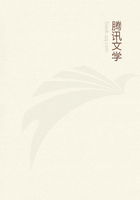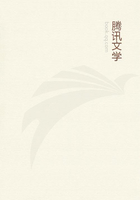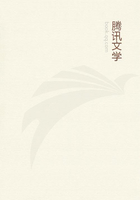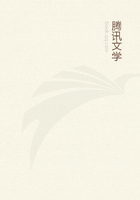"He's turned up early,hasn't he?"commented the second engineer,and smiled indifferently.He was an abstemious man with a good digestion and a placid,reasonable view of life even when hungry.
"Yes,"I said."Shut up with the old man.Some very particular business.""He will spin him a damned endless yarn,"observed the chief engineer.
He smiled rather sourly.He was dyspeptic and suffered from gnawing hunger in the morning.The second smiled broadly,a smile that made two vertical folds on his shaven cheeks.And Ismiled too,but I was not exactly amused.In that man,whose name apparently could not be uttered anywhere in the Malay Archipelago without a smile,there was nothing amusing whatever.
That morning he breakfasted with us silently,looking mostly into his cup.I informed him that my men came upon his pony capering in the fog on the very brink of the eight-foot-deep well in which he kept his store of guttah.The cover was off with no one near by,and the whole of my crew just missed going heels over head into that beastly hole.Jurumudi Itam,our best quartermaster,deft at fine needlework,he who mended the ship's flags and sewed buttons on our coats,was disabled by a kick on the shoulder.
Both remorse and gratitude seemed foreign to Almayer's character.
He mumbled:
"Do you mean that pirate fellow?"
"What pirate fellow?The man has been in the ship eleven years,"I said indignantly.
"It's his looks,"Almayer muttered for all apology.
The sun had eaten up the fog.From where we sat under the after awning we could see in the distance the pony tied up in front of Almayer's house,to a post of the verandah.We were silent for a long time.All at once Almayer,alluding evidently to the subject of his conversation in the captain's cabin,exclaimed anxiously across the table:
"I really don't know what I can do now!"
Captain C--only raised his eyebrows at him,and got up from his chair.We dispersed to our duties,but Almayer,half dressed as he was in his cretonne pyjamas and the thin cotton singlet,remained on board,lingering near the gangway as though he could not make up his mind whether to go home or stay with us for good.
Our Chinamen boys gave him side glances as they went to and fro;and Ah Sing,our young chief steward,the handsomest and most sympathetic of Chinamen,catching my eye,nodded knowingly at his burly back.In the course of the morning I approached him for a moment.
"Well,Mr.Almayer,"I addressed him easily,"you haven't started on your letters yet."We had brought him his mail and he had held the bundle in his hand ever since we got up from breakfast.He glanced at it when I spoke and,for a moment,it looked as if he were on the point of opening his fingers and letting the whole lot fall overboard.
I believe he was tempted to do so.I shall never forget that man afraid of his letters.
"Have you been long out from Europe?"he asked me.
"Not very.Not quite eight months,"I told him."I left a ship in Samarang with a hurt back and have been in the hospital in Singapore some weeks."He sighed.
"Trade is very bad here."
"Indeed!"
"Hopeless!See these geese?"
With the hand holding the letters he pointed out to me what resembled a patch of snow creeping and swaying across the distant part of his compound.It disappeared behind some bushes.
"The only geese on the East Coast,"Almayer informed me in a perfunctory mutter without a spark of faith,hope or pride.
Thereupon,with the same absence of any sort of sustaining spirit he declared his intention to silence a fat bird and send him on board for us not later than next day.
I had heard of these largesses before.He conferred a goose as if it were a sort of Court decoration given only to the tried friends of the house.I had expected more pomp in the ceremony.
The gift had surely its special quality,multiple and rare.From the only flock on the East Coast!He did not make half enough of it.That man did not understand his opportunities.However,Ithanked him at some length.
"You see,"he interrupted abruptly in a very peculiar tone,"the worst of this country is that one is not able to realise.it's impossible to realise."His voice sank into a languid mutter."And when one has very large interests.very important interests."he finished faintly."up the river."We looked at each other.He astonished me by giving a start and making a very queer grimace.
"Well,I must be off,"he burst out hurriedly."So long!"At the moment of stepping over the gangway he checked himself though,to give me a mumbled invitation to dine at his house that evening with my captain,an invitation which I accepted.I don't think it could have been possible for me to refuse.
I like the worthy folk who will talk to you of the exercise of free will "at any rate for practical purposes."Free,is it?
For practical purposes!Bosh!How could I have refused to dine with that man?I did not refuse simply because I could not refuse.Curiosity,a healthy desire for a change of cooking,common civility,the talk and the smiles of the previous twenty days,every condition of my existence at that moment and place made irresistibly for acceptance;and,crowning all that,there was the ignorance,the ignorance,I say,the fatal want of foreknowledge to counter-balance these imperative conditions of the problem.A refusal would have appeared perverse and insane.
Nobody unless a surly lunatic would have refused.But if I had not got to know Almayer pretty well it is almost certain there would never have been a line of mine in print.
I accepted then--and I am paying yet the price of my sanity.The possessor of the only flock of geese on the East Coast is responsible for the existence of some fourteen volumes,so far.
The number of geese he had called into being under adverse climatic conditions was considerably more than fourteen.The tale of volumes will never overtake the counting of heads,I am safe to say;but my ambitions point not exactly that way,and whatever the pangs the toil of writing has cost me I have always thought kindly of Almayer.
I wonder,had he known anything of it,what his attitude would have been?This is something not to be discovered in this world.
But if we ever meet in the Elysian Fields--where I cannot depict him to myself otherwise than attended in the distance by his flock of geese (birds sacred to Jupiter)--and he addresses me in the stillness of that passionless region,neither light nor darkness,neither sound nor silence,and heaving endlessly with billowy mists from the impalpable multitudes of the swarming dead,I think I know what answer to make.
I would say,after listening courteously to the unvibrating tone of his measured remonstrances,which should not disturb,of course,the solemn eternity of stillness in the least--I would say something like this:
"It is true,Almayer,that in the world below I have converted your name to my own uses.But that is a very small larceny.
What's in a name,O Shade?If so much of your old mortal weakness clings to you yet as to make you feel aggrieved (it was the note of your earthly voice,Almayer),then,I entreat you,seek speech without delay with our sublime fellow-Shade--with him who,in his transient existence as a poet,commented upon the smell of the rose.He will comfort you.You came to me stripped of all prestige by men's queer smiles and the disrespectful chatter of every vagrant trader in the Islands.Your name was the common property of the winds:it,as it were,floated naked over the waters about the Equator.I wrapped round its unhonoured form the royal mantle of the tropics and have essayed to put into the hollow sound the very anguish of paternity--feats which you did not demand from me--but remember that all the toil and all the pain were mine.In your earthly life you haunted me,Almayer.Consider that this was taking a great liberty.Since you were always complaining of being lost to the world,you should remember that if I had not believed enough in your existence to let you haunt my rooms in Bessborough Gardens,you would have been much more lost.You affirm that had I been capable of looking at you with a more perfect detachment and a greater simplicity,I might have perceived better the inward marvellousness which,you insist,attended your career upon that tiny pin-point of light,hardly visible far,far below us,where both our graves lie.No doubt!But reflect,O complaining Shade!that this was not so much my fault as your crowning misfortune.I believed in you in the only way it was possible for me to believe.It was not worthy of your merits?So be it.
But you were always an unlucky man,Almayer.Nothing was ever quite worthy of you.What made you so real to me was that you held this lofty theory with some force of conviction and with an admirable consistency."It is with some such words translated into the proper shadowy expressions that I am prepared to placate Almayer in the Elysian Abode of Shades,since it has come to pass that having parted many years ago,we are never to meet again in this world.
ChapterV.
In the career of the most unliterary of writers,in the sense that literary ambition had never entered the world of his imagination,the coming into existence of the first book is quite an inexplicable event.In my own case I cannot trace it back to any mental or psychological cause which one could point out and hold to.The greatest of my gifts being a consummate capacity for doing nothing,I cannot even point to boredom as a rational stimulus for taking up a pen.The pen at any rate was there,and there is nothing wonderful in that.Everybody keeps a pen (the cold steel of our days)in his rooms in this enlightened age of penny stamps and halfpenny postcards.In fact,this was the epoch when by means of postcard and pen Mr.Gladstone had made the reputation of a novel or two.And I too had a pen rolling about somewhere--the seldom-used,the reluctantly-taken-up pen of a sailor ashore,the pen rugged with the dried ink of abandoned attempts,of answers delayed longer than decency permitted,of letters begun with infinite reluctance and put off suddenly till next day--tell next week as likely as not!The neglected,uncared-for pen,flung away at the slightest provocation,and under the stress of dire necessity hunted for without enthusiasm,in a perfunctory,grumpy worry,in the "Where the devil is the beastly thing gone to?"ungracious spirit.Where indeed!It might have been reposing behind the sofa for a day or so.My landlady's anaemic daughter (as Ollendorff would have expressed it),though commendably neat,had a lordly,careless manner of approaching her domestic duties.Or it might even be resting delicately poised on its point by the side of the table-leg,and when picked up show a gaping,inefficient beak which would have discouraged any man of literary instincts.But not me!"Never mind.This will do."O days without guile!If anybody had told me then that a devoted household,having a generally exaggerated idea of my talents and importance,would be put into a state of tremor and flurry by the fuss I would make because of a suspicion that somebody had touched my sacrosanct pen of authorship,I would have never deigned as much as the contemptuous smile of unbelief.There are imaginings too unlikely for any kind of notice,too wild for indulgence itself,too absurd for a smile.Perhaps,had that seer of the future been a friend,I should have been secretly saddened."Alas!"I would have thought,looking at him with an unmoved face,"the poor fellow is going mad."I would have been,without doubt,saddened;for in this world where the journalists read the signs of the sky,and the wind of heaven itself,blowing where it listeth,does so under the prophetical management of the Meteorological Office,but where the secret of human hearts cannot be captured either by prying or praying,it was infinitely more likely that the sanest of my friends should nurse the germ of incipient madness than that I should turn into a writer of tales.
To survey with wonder the changes of one's own self is a fascinating pursuit for idle hours.The field is so wide,the surprises so varied,the subject so full of unprofitable but curious hints as to the work of unseen forces,that one does not weary easily of it.I am not speaking here of megalomaniacs who rest uneasy under the crown of their unbounded conceit--who really never rest in this world,and when out of it go on fretting and fuming on the straitened circumstances of their last habitation,where all men must lie in obscure equality.Neither am I thinking of those ambitious minds who,always looking forward to some aim of aggrandisement,can spare no time for a detached,impersonal glance upon themselves.
And that's a pity.They are unlucky.These two kinds,together with the much larger band of the totally unimaginative,of those unfortunate beings in whose empty and unseeing gaze (as a great French writer has put it)"the whole universe vanishes into blank nothingness,"miss,perhaps,the true task of us men whose day is short on this earth,the abode of conflicting opinions.The ethical view of the universe involves us at last in so many cruel and absurd contradictions,where the last vestiges of faith,hope,charity,and even of reason itself,seem ready to perish,that I have come to suspect that the aim of creation cannot be ethical at all.I would fondly believe that its object is purely spectacular:a spectacle for awe,love,adoration,or hate,if you like,but in this view--and in this view alone--never for despair!Those visions,delicious or poignant,are a moral end in themselves.The rest is our affair--the laughter,the tears,the tenderness,the indignation,the high tranquillity of a steeled heart,the detached curiosity of a subtle mind--that's our affair!And the unwearied self-forgetful attention to every phase of the living universe reflected in our consciousness may be our appointed task on this earth.A task in which fate has perhaps engaged nothing of us except our conscience,gifted with a voice in order to bear true testimony to the visible wonder,the haunting terror,the infinite passion and the illimitable serenity;to the supreme law and the abiding mystery of the sublime spectacle.
Chi lo sa?It may be true.In this view there is room for every religion except for the inverted creed of impiety,the mask and cloak of arid despair;for every joy and every sorrow,for every fair dream,for every charitable hope.The great aim is to remain true to the emotions called out of the deep encircled by the firmament of stars,whose infinite numbers and awful distances may move us to laughter or tears (was it the Walrus or the Carpenter,in the poem,who "wept to see such quantities of sand"?),or,again,to a properly steeled heart,may matter nothing at all.
The casual quotation,which had suggested itself out of a poem full of merit,leads me to remark that in the conception of a purely spectacular universe,where inspiration of every sort has a rational existence,the artist of every kind finds a natural place;and amongst them the poet as the seer par excellence.
Even the writer of prose,who in his less noble and more toilsome task should be a man with the steeled heart,is worthy of a place,providing he looks on with undimmed eyes and keeps laughter out of his voice,let who will laugh or cry.Yes!Even he,the prose artist of fiction,which after all is but truth often dragged out of a well and clothed in the painted robe of imaged phrases--even he has his place amongst kings,demagogues,priests,charlatans,dukes,giraffes,Cabinet Ministers,Fabians,bricklayers,apostles,ants,scientists,Kaffirs,soldiers,sailors,elephants,lawyers,dandies,microbes and constellations of a universe whose amazing spectacle is a moral end in itself.
Here I perceive (speaking without offence)the reader assuming a subtle expression,as if the cat were out of the bag.I take the novelist's freedom to observe the reader's mind formulating the exclamation,"That's it!The fellow talks pro domo."Indeed it was not the intention!When I shouldered the bag I was not aware of the cat inside.But,after all,why not?The fair courtyards of the House of Art are thronged by many humble retainers.And there is no retainer so devoted as he who is allowed to sit on the doorstep.The fellows who have got inside are apt to think too much of themselves.This last remark,I beg to state,is not malicious within the definition of the law of libel.It's fair comment on a matter of public interest.But never mind.Pro domo.So be it.For his house tant que vous voudrez.And yet in truth I was by no means anxious to justify my existence.The attempt would have been not only needless and absurd,but almost inconceivable,in a purely spectacular universe,where no such disagreeable necessity can possibly arise.It is sufficient for me to say (and I am saying it at some length in these pages):"J'ai vecu."I have existed,obscure amongst the wonders and terrors of my time,as the Abbe Sieyes,the original utterer of the quoted words,had managed to exist through the violences,the crimes,and the enthusiasms of the French Revolution."J'ai vecu",as I apprehend most of us manage to exist,missing all along the varied forms of destruction by a hair's-breadth,saving my body,that's clear,and perhaps my soul also,but not without some damage here and there to the fine edge of my conscience,that heirloom of the ages,of the race,of the group,of the family,colourable and plastic,fashioned by the words,the looks,the acts,and even by the silences and abstentions surrounding one's childhood;tinged in a complete scheme of delicate shades and crude colours by the inherited traditions,beliefs,or prejudices--unaccountable,despotic,persuasive,and often,in its texture,romantic.
And often romantic!The matter in hand,however,is to keep these reminiscences from turning into confessions,a form of literary activity discredited by Jean Jacques Rousseau on account of the extreme thoroughness he brought to the work of justifying his own existence;for that such was his purpose is palpably,even grossly,visible to an unprejudiced eye.But then,you see,the man was not a writer of fiction.He was an artless moralist,as is clearly demonstrated by his anniversaries being celebrated with marked emphasis by the heirs of the French Revolution,which was not a political movement at all,but a great outburst of morality.He had no imagination,as the most casual perusal of "Emile"will prove.He was no novelist,whose first virtue is the exact understanding of the limits traced by the reality of his time to the play of his invention.Inspiration comes from the earth,which has a past,a history,a future,not from the cold and immutable heaven.A writer of imaginative prose (even more than any other sort of artist)stands confessed in his works.His conscience,his deeper sense of things,lawful and unlawful,gives him his attitude before the world.Indeed,every one who puts pen to paper for the reading of strangers (unless a moralist,who,generally speaking,has no conscience except the one he is at pains to produce for the use of others)can speak of nothing else.It is M.Anatole France,the most eloquent and just of French prose writers,who says that we must recognise at last that,"failing the resolution to hold our peace,we can only talk of ourselves."This remark,if I remember rightly,was made in the course of a sparring match with the late Ferdinand Brunetiere over the principles and rules of literary criticism.As was fitting for a man to whom we owe the memorable saying,"The good critic is he who relates the adventures of his soul amongst masterpieces,"M.
Anatole France maintained that there were no rules and no principles.And that may be very true.Rules,principles and standards die and vanish every day.Perhaps they are all dead and vanished by this time.These,if ever,are the brave,free days of destroyed landmarks,while the ingenious minds are busy inventing the forms of the new beacons which,it is consoling to think,will be set up presently in the old places.But what is interesting to a writer is the possession of an inward certitude that literary criticism will never die,for man (so variously defined)is,before everything else,a critical animal.And,as long as distinguished minds are ready to treat it in the spirit of high adventure,literary criticism shall appeal to us with all the charm and wisdom of a well-told tale of personal experience.
For Englishmen especially,of all the races of the earth,a task,any task,undertaken in an adventurous spirit acquires the merit of romance.But the critics as a rule exhibit but little of an adventurous spirit.They take risks,of course--one can hardly live without that.The daily bread is served out to us (however sparingly)with a pinch of salt.Otherwise one would get sick of the diet one prays for,and that would be not only improper,but impious.From impiety of that or any other kind--save us!An ideal of reserved manner,adhered to from a sense of proprieties,from shyness,perhaps,or caution,or simply from weariness,induces,I suspect,some writers of criticism to conceal the adventurous side of their calling,and then the criticism becomes a mere "notice,"as it were the relation of a journey where nothing but the distances and the geology of a new country should be set down;the glimpses of strange beasts,the dangers of flood and field,the hair's-breadth escapes,and the sufferings (oh,the sufferings too!I have no doubt of the sufferings)of the traveller being carefully kept out;no shady spot,no fruitful plant being ever mentioned either;so that the whole performance looks like a mere feat of agility on the part of a trained pen running in a desert.A cruel spectacle--a most deplorable adventure."Life,"in the words of an immortal thinker of,I should say,bucolic origin,but whose perishable name is lost to the worship of posterity--"life is not all beer and skittles."Neither is the writing of novels.It isn't really.Je vous donne ma parole d'honneur that it--is--not.Not all.I am thus emphatic because some years ago,I remember,the daughter of a general.
Sudden revelations of the profane world must have come now and then to hermits in their cells,to the cloistered monks of Middle Ages,to lonely sages,men of science,reformers;the revelations of the world's superficial judgment,shocking to the souls concentrated upon their own bitter labour in the cause of sanctity,or of knowledge,or of temperance,let us say,or of art,if only the art of cracking jokes or playing the flute.And thus this general's daughter came to me--or I should say one of the general's daughters did.There were three of these bachelor ladies,of nicely graduated ages,who held a neighbouring farmhouse in a united and more or less military occupation.The eldest warred against the decay of manners in the village children,and executed frontal attacks upon the village mothers for the conquest of curtseys.It sounds futile,but it was really a war for an idea.The second skirmished and scouted all over the country;and it was that one who pushed a reconnaissance right to my very table--I mean the one who wore stand-up collars.
She was really calling upon my wife in the soft spirit of afternoon friendliness,but with her usual martial determination.
She marched into my room swinging her stick.but no--I mustn't exaggerate.It is not my speciality.I am not a humoristic writer.In all soberness,then,all I am certain of is that she had a stick to swing.
No ditch or wall encompassed my abode.The window was open;the door too stood open to that best friend of my work,the warm,still sunshine of the wide fields.They lay around me infinitely helpful,but truth to say I had not known for weeks whether the sun shone upon the earth and whether the stars above still moved on their appointed courses.I was just then giving up some days of my allotted span to the last chapters of the novel "Nostromo,"a tale of an imaginary (but true)seaboard,which is still mentioned now and again,and indeed kindly,sometimes in connection with the word "failure"and sometimes in conjunction with the word "astonishing."I have no opinion on this discrepancy.It's the sort of difference that can never be settled.All I know is that,for twenty months,neglecting the common joys of life that fall to the lot of the humblest on this earth,I had,like the prophet of old,"wrestled with the Lord"for my creation,for the headlands of the coast,for the darkness of the Placid Gulf,the light on the snows,the clouds on the sky,and for the breath of life that had to be blown into the shapes of men and women,of Latin and Saxon,of Jew and Gentile.
These are,perhaps,strong words,but it is difficult to characterise otherwise the intimacy and the strain of a creative effort in which mind and will and conscience are engaged to the full,hour after hour,day after day,away from the world,and to the exclusion of all that makes life really lovable and gentle--something for which a material parallel can only be found in the everlasting sombre stress of the westward winter passage round Cape Horn.For that too is the wrestling of men with the might of their Creator,in a great isolation from the world,without the amenities and consolations of life,a lonely struggle under a sense of over-matched littleness,for no reward that could be adequate,but for the mere winning of a longitude.Yet a certain longitude,once won,cannot be disputed.The sun and the stars and the shape of your earth are the witnesses of your gain;whereas a handful of pages,no matter how much you have made them your own,are at best but an obscure and questionable spoil.
Here they are."Failure"--"Astonishing":take your choice;or perhaps both,or neither--a mere rustle and flutter of pieces of paper settling down in the night,and undistinguishable,like the snowflakes of a great drift destined to melt away in the sunshine.
"How do you do?"

